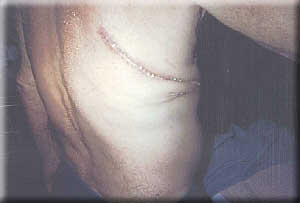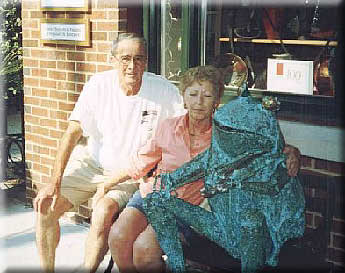Treating Mesothelioma
Robert Taylor was born 63 years ago in Kingsport, Tennessee. To this day, he remains a Tennessee Volunteer football fanatic. He bleeds orange and knows the importance of a good "tailgate." He is a true gentleman of the South, with a pure, southern comfort voice. When you speak to him you can recognize right off what a relaxed, pleasant man he is.
After graduating from Dobyns-Bennett High School in 1960, Robert immediately joined the United States Navy and served his country as a boiler tender for the next five years. Upon his honorable discharge, he traveled to Charleston, South Carolina and went to work as a boiler tender at the Charleston Naval Shipyards, applying the knowledge he learned in the Navy. For the next 29 years, he worked as a boiler tender, boiler maker and ship inspector. He was often recognized for his work, having been awarded several certificates of achievement and excellence, including those for Outstanding Performance, Navy Certificates of Commendation and Civilian Employee with U.S. Navy Certificate of Appreciation.
Robert retired in 1993 after a long and rewarding career. He was fortunate enough to enjoy retirement at a young age. It was now time to enjoy his free time at home in Eutawville, South Carolina with his wife, Mildred. Unfortunately, his retirement would be short-lived.
In the early spring of this year, Robert noticed some pain in his right chest. He had been suffering from a chronic cough and attributed the pain to his coughing bouts. When the pain became too much to ignore, he met with his family physician. In May, a chest film and a CT scan were taken which revealed fluid in his right thoracic cavity as well as some pleural thickening. On May 22, his doctors removed the fluid via a right-sided ultrasound-guided thoracentesis. During the procedure, doctors discovered an abnormal persistent thickening in the major fissure. Tests performed on the removed fluid showed atypical mesothelial cells.
On June 3, Robert consulted with a surgeon who recommended a right video-assisted thoracoscopic pleural biopsy with a possible talc pleurodesis. They wanted to be sure of what was going on deep in Robert's chest.
The surgery took place on June 9. Upon examination of the lung the doctors noted adhesions laterally and anteriorly. Inspection of the pleura revealed significant studding of the right pleural, the diaphragmatic pleura and the medial pleura. Biopsies as well as additional fluid were obtained for testing. The doctors also went ahead and inserted a talc powder between his pleural lining and ribcage in hopes of keeping the fluid from returning. Pathologists examined the removed tissue and returned a diagnosis of malignant mesothelioma.

When the doctors told them of the diagnosis, Robert and Mildred were shocked. Mesothelioma? What is that? How could this happen? They were advised that there is not a standard of care for mesothelioma. The Taylors consulted with local oncologists, searched the Internet and researched surgeons. They discovered the Mesothelioma Applied Research Foundation (link) and through conversation with Christopher Hahn, learned of Dr. David Harpole, a thoracic surgeon at Duke University Medical Center. They met with Dr. Harpole who discussed surgery as a treatment, specifically extra-pleural pneumonectomy (EPP).
After careful consideration, Robert and his family felt that surgery was his best chance. Robert said, "Dr. Harpole and his staff made me feel so comfortable and at ease. I knew that I could trust him to do his very best for me." On July 16, Dr. Harpole performed the EPP, removing Robert's right lung, at Duke University Medical Center. Dr. Harpole told Robert that he was pleased and felt "pretty good" about the outcome of the surgery. There was no visible or pathological evidence that the cancer had spread to the lymph nodes. With no lymph node involvement, Robert was given a very promising chance of recovery.
The next day, Robert was up and out of bed. His spirits were high, as they always are, even through short bouts of pain. He was released from the hospital on July 21, just five days after his surgery. Dr. Harpole and the Duke medical staff felt that the faster he was up and out of the hospital, the better chance he had of regaining a somewhat "normal" life.
Robert and Mildred spent the first night at a local motel with plans to leave in the morning for the five-hour drive home. But, according to Robert, his discharge was just a "little too early." Robert praises the staff at Duke University Medical Center. He said, "I wish I could have stayed hospitalized for another four or five days. The people at Duke were fantastic and I miss all that pampering." Robert and Mildred spent four more long days at the motel before Robert was able to make the five-hour trip back home.
Robert returned to Duke for a follow-up visit with Dr. Harpole on August 5. He was told that he would be able to begin chemotherapy treatments in approximately eight weeks. Dr. Jeffrey Crawford, an oncologist at Duke, coordinated the treatments and worked with an oncologist closer to Robert's home in Charleston.

Robert continued to grow stronger. In October he started his cycle of chemotherapy with his oncologist in Charleston. Robert had five weeks under his belt and planned to finish his treatments in mid-December. The treatments drained every ounce of his energy. Robert complained that he could no longer keep up with all of his responsibilities. His oncologist prescribed Procrit to help fight his fatigue, a common side effect of chemotherapy. Robert continued to have some shortness of breath and bouts with pain. Robert described his pain as "like there's something in my chest that shouldn't be there. When the lung was removed something was put in its place, but I don't know what. I'm going to find out though, because it hurts like the devil."
Robert had planned on discussing this unrelenting pain with Dr. Harpole during his December 2, 2003, follow-up physical and treatment evaluation. But that appointment was canceled when his chemotherapy schedule changed. During the last week of November, Robert's breathing became increasingly difficult. He could barely walk from his bedroom to the living room. Robert was placed on oxygen 24 hours a day. On Monday, December 1, when Robert went in for chemotherapy, he received only one of the two-drug combination when it was determined that his white cell blood count was dangerously low. He was immediately given a unit of blood. Robert returned the following day for a second unit.
Mildred and Robert are hopeful that with added rest and a week off from chemotherapy he will regain his strength and energy. Mildred believes that a planned visit from his sister and her husband will be just what Robert needs to lift his spirits and put him back on track to recovery. His appointment with Dr. Harpole has been rescheduled for early 2004.
The Taylor family continues to be very optimistic about his recovery. They are grateful for the excellent care he has received and the professional medical staff. They are also most appreciative to Chris Hahn and MARF. According to Robert's step-daughter Tammy, "I know we have a very long, difficult road ahead of us, but if it were not for MARF's website we wouldn't have any road at all." Robert promises that as soon as he is able, he will begin construction on a room to house his vast collection of Tennessee Volunteer paraphernalia.
We will walk with this gentleman as he travels down his path to recovery.
*** POSTED DECEMBER 18, 2003 ***
Mr. Robert Taylor passed away on February 12, 2005


